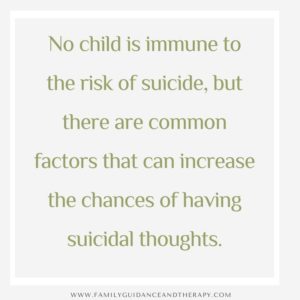Suicide and Children
Suicide is not a pleasant topic to talk about. Parents and people, in general, avoid discussing suicide because it can stir up frightening, sad, and alarming feelings. But in today’s world, we can no longer afford to not talk about it, especially as it deeply involves our youth.
The alarming facts are that suicide is the second leading cause of death in children and teens, and we are seeing steadily rising increases in suicide death rates between the ages of 10 and 19 years old—up to 60% increases in recent years.
Suicide is preventable. Young people who are contemplating suicide often give warning signs of their distress. Some signs are subtle, yet some are more common and pronounced. Knowing the risk factors, recognizing the warning signs, and knowing how to respond can help prevent suicide.
Suicide Risk Factors
No child is immune to the risk of suicide, but there are common factors that can increase the chances of having suicidal thoughts.
- Previous suicide attempt(s) (including a family history of suicide or suicide attempts)
- Experiencing crises (grief, loss of a family member, friend, or a home, physical or sexual abuse)
- Family dysfunction or stress
- Chronic bullying
- Access to firearms
- Mental illness (including depression and chronic anxiety)
- Substance abuse
Having an awareness of any of the risk factors in a child’s life is a solid step in the prevention of suicide.
Suicide Warning Signs in Children/Teens
The warning signs in children and teens can be subtle but learning how to spot suicidal tendencies plays a vital role in intervention.
The most common observable signs are:
- Talking about wanting to die (or drawing out, play-acting/pretending) death, suicide, or making plans for suicide
- Displaying severe emotional pain or distress
- Expressing feelings of hopelessness
- Talking about being a burden to others (or not belonging in the world/family/community/school, etc.)
- Withdrawing from family, friends, and previously enjoyed activities
- Behavior that is out of character (repeated anger, aggressiveness, hostility, or recklessness)
- Problems in school (poor grades, missed classes, inappropriate behavior)
- Increased risk-taking behaviors (vandalism, promiscuous sex, substance abuse)
A teenager might spout out the alarming words (especially while agitated, angry, or depressed), “You will be better off without me!”, or “What’s the point of living?”, while others remain quiet and internalize their turmoil.
A young child, however, when thinking about what will happen after they are gone, may give their favorite toys and possessions away, or they may talk about splitting the toys up amongst the people that they know. They may also navigate their intense emotions by drawing pictures or writing stories that depict suicide. They may also talk about their feelings of hopelessness, or how they are a burden to others.
We must familiarize ourselves with the common signs of suicide ideation in our youth, but know that it can display more subtly in younger children. Regardless of a child’s age, however, it is important to never take any warning signs lightly, whether they be subtle or not. Each child is unique in their own set of circumstances.
Please trust your instinct, and especially if you notice behavior changes or warning signs that are not a one-time occurrence.
How to Respond to a Suicide Warning Sign
There is an overlying fear that talking about suicide will cause children and teens to think about it. One thing is certain however, you may never know that your child is having suicidal thoughts if you don’t ask.
If you or someone you know is in immediate danger please call 911
If you are not in immediate danger because of thoughts of suicide, but need someone to talk with about your suicidal feelings, please call one of the following national suicide prevention lines:
1-800-SUICIDE (1-800-784-2433)
1-800-273-TALK (1-800-273-8255)
When we, adults or children, talk about what troubles us in life, suicide especially, we reduce the hold that it has on us. It can feel like a much bigger problem when we don’t talk about it.
- Remain calm and talk with your child.
- Ask direct questions. Are you thinking of suicide? Are you thinking of hurting yourself? Are you feeling sad or depressed lately? These questions show your child that you have empathy. It shows your child that you care. Do not promise that you will keep your child’s suicidal thoughts a secret. You cannot seek help for your child and keep this promise!
- Remember that having an open conversation is important. Listen attentively and do not judge.
- Repeat back to your child what you have heard them say. This confirms to your child that you are listening.
- Create an open-door relationship with your child. Ask your child to reach out to you when they feel overwhelmed, depressed, angry, or if they have thoughts of hurting themselves or giving up on life completely.
- Having thoughts of suicide does not make anyone a bad person. Tell this to your child.
- Remind your child that they are not alone with their feelings and that they can connect and share with others (a qualified professional, community help, trusted family member, etc.). Find the connection that your child needs and desires. Remember that relationships matter.
- Tell your child that help is available and that you will get it for them.
Call a Trusted Professional
Suicide ideation can come, and it can go, and so can the associated warning signs and common behaviors. Continue to take the threat of suicide seriously even if your child no longer displays any behaviors or warning signs.
Don’t hesitate. Call a trusted professional. Get the support that your child needs.
Suicidal thoughts can happen to anyone at any age or any stage in life. If you or your child are struggling with suicidal thoughts, understand that you are not alone. Reach out and tell someone. Get the help that you or your child needs.
We are here for you! Make an appointment today.
September is National Suicide Awareness Month and September 10 is World Suicide Prevention Day every year. Please help in the efforts to encourage suicide awareness. Please share this article with others that may need it. Openly discuss suicide prevention. It is not a taboo topic!

